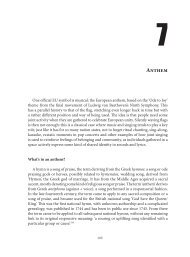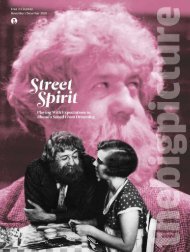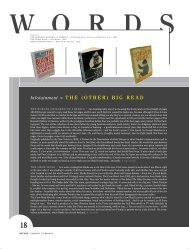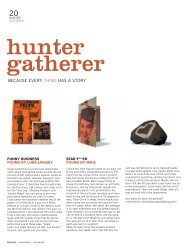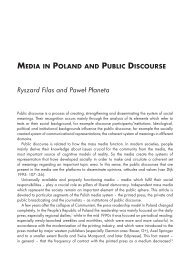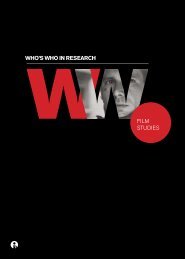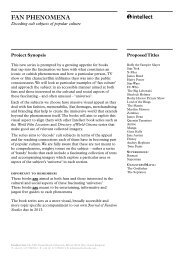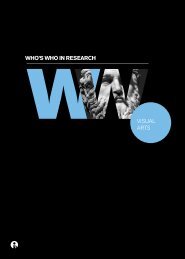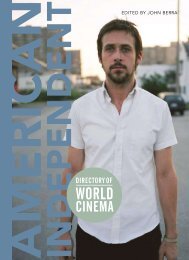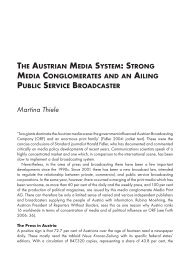Andrea Czepek, Melanie Hellwig and Eva Nowak - Intellect
Andrea Czepek, Melanie Hellwig and Eva Nowak - Intellect
Andrea Czepek, Melanie Hellwig and Eva Nowak - Intellect
Create successful ePaper yourself
Turn your PDF publications into a flip-book with our unique Google optimized e-Paper software.
240 | PRESS FREEDOM AND PLURALISM IN EUROPE<br />
also whether the fees are necessary to make an independent pluralistic TV programme possible<br />
or whether economic liberty supports (external) pluralism in the media market. The German<br />
government is currently planning to change the model of raising the fees, but a new model<br />
would have to be endorsed by the EU Commission – which may start the discussion anew.<br />
The big current conflict in German broadcasting is the question of how far the public<br />
broadcasters should develop their Internet activities. According to the States Treaty on<br />
Broadcasting in Unified Germany (Staatsvertrag über den Rundfunk im vereinten Deutschl<strong>and</strong>),<br />
public service broadcasters are allowed to use all new technologies concerning production <strong>and</strong><br />
distribution of new forms of broadcasting. Nevertheless, private broadcasters as well as printed<br />
press publishers claim that the m<strong>and</strong>atory PSB-fees do not allow for the financing of Internet<br />
activities, but only traditional radio <strong>and</strong> television. The largest regional newspaper publisher,<br />
the WAZ (Westdeutsche Allgemeine Zeitung), however, started an online co-operation in 2008<br />
with Westdeutscher Rundfunk (WDR), the big PSB in North Rhine-Westphalia. Der Westen is an<br />
internet portal for the western region which offers TV reports on regional topics produced by<br />
the WDR for its own regular TV programme (see WDR 2008). The co-operation between WAZ<br />
<strong>and</strong> WDR is limited to one year for the time being. Not just media journalists are now discussing<br />
whether both are still independent enough to criticize each other, or in other words: whether<br />
pluralism is endangered <strong>and</strong> whether WDR should finance the TV reports with broadcasting<br />
fees which are then offered on Der Westen-online portal, owned by the rich publisher WAZ.<br />
The WDR broadcasting council speculated that WAZ wanted to bridge the period until their<br />
own regional TV channel for the Ruhr region, which is already licensed, starts broadcasting with<br />
cheap WDR video distributions. The WDR would thus finance a new competitor (see Lilienthal<br />
2008). The WDR/WAZ co-operation is only a start – other public service broadcasters have<br />
started negotiations with publishers (Lilienthal 2008).<br />
However, what most publishers <strong>and</strong> private broadcasters dislike is not this kind of co-operation<br />
as such, although some assume that the PSB were only trying to improve their negotiating<br />
position in the conflict with private broadcasters on the PSB’s own Internet activities (see<br />
Lilienthal 2008). The real point is the PSB’s own Internet portals <strong>and</strong> the question of what<br />
they should be allowed to offer. The Association of Private Broadcasters <strong>and</strong> Telemedia,<br />
Verein Privater Rundfunk und Telemedien e.V. (VPRT), are critical of the fact that the Internet<br />
portals of ARD <strong>and</strong> ZDF have, in their view, become a comprehensive informational offer<br />
which goes beyond the PSB’s public m<strong>and</strong>ate according to the State Broadcasting Treaty,<br />
the ‘Rundfunkstaatsvertrag’. The VPRT claims that the online activities of ARD <strong>and</strong> ZDF are not<br />
covered by the 0.75 per cent of the broadcasting fee meant for online activities, but are much<br />
more expensive. Only information directly connected to the PSB’s output should be allowed<br />
online, according to the VPRT (see VPRT 2008). ZDF <strong>and</strong> ARD offer a comprehensive <strong>and</strong><br />
free of charge video on dem<strong>and</strong> via Internet since 2007 <strong>and</strong> 2008, respectively. They publish<br />
information <strong>and</strong> entertainment, fictional <strong>and</strong> non-fictional programmes but also offer additional<br />
interactive <strong>and</strong> multimedia elements adequate for the online medium. To meet half way, the ZDF<br />
decided in spring 2008 to offer programmes in their online programme archive Mediathek<br />
(video-on-dem<strong>and</strong>) for a limited time only, to renounce advertising, games <strong>and</strong> external service<br />
partners, such as hotel bookings <strong>and</strong> route planners, <strong>and</strong> to apply a three-step test to evaluate<br />
the public value of a definite content (see epd Medien 2008a). The conflict created a situation<br />
of fierce competition on a new media market regarding the Internet <strong>and</strong> mobile communication



